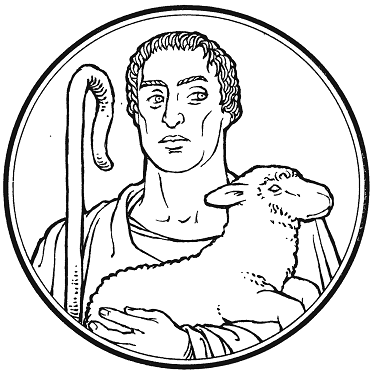Readings: Ezekiel 34:11–16 | 1 Peter 2:21–25 | John 10:11-16
Text: John 10:11-16
The Lord Jesus says, “I am the Good Shepherd.” This Sunday in the Church year has come to be known as “Good Shepherd Sunday.” So, let’s to dig deeper into what this statement of Jesus means. Let us not just pass over this, and adopt a picture of Jesus that spends the day nuzzling cute little sheep.
I. “I am” – Greek: ego eimi

Jesus is saying that He is true God, together with all that implies. John’s Gospel is known for seven such “I am” statements. This is more than your typical metaphor. It goes back to way God revealed Himself to His people of old. Most notably, with Moses in Exodus 3, we read:
13 Then Moses said to God, “If I come to the people of Israel and say to them, ‘The God of your fathers has sent me to you,’ and they ask me, ‘What is his name?’ what shall I say to them?” 14 God said to Moses, “I am who I am.” And he said, “Say this to the people of Israel: ‘I am has sent me to you.’ ” 15 God also said to Moses, “Say this to the people of Israel: ‘The Lord, the God of your fathers, the God of Abraham, the God of Isaac, and the God of Jacob, has sent me to you.’ This is my name forever, and thus I am to be remembered throughout all generations.
The translation which we see in our Bibles, “the Lord” (small caps) is the Hebrew traditional way to render this covenant Name of God, “I am” (especially see Gen. 2:4 creation, Ex. 13:21 deliverance) It means that this is the living God; the God who is without any qualifiers, who created all things ex nihilo (out of nothing, John 1:3), and He depends on no other.
It’s not apparent from the English, but this is why Jesus gets into such hot water with the Jews in John 8. If He were nothing more than a raving lunatic, saying He lived before Abraham, they could have overlooked that. But He says, “When you have lifted up the Son of Man, then you will know that I am…[and] before Abraham existed, I am.” (John 8:28, 8:58) He is saying that He is truly God, the God of Abraham, Isaac, and Jacob.
II. “Good” – Greek: kalos

The word “good” gets thrown around like an old t-shirt in our day. “How are you?” “I’m good.” Jesus caught the rich young man off guard when He replied to the address, “Good Teacher” in Mark 10 by responding, “Why do you call me good? No one is good except God alone.” (Mark 10:17-18) Well, when you put it that way, it contracts all our measure of good against the “gold standard” which is God Himself. So also here in the Gospel:
The good shepherd lays down his life for the sheep. 12 He who is a hired hand and not a shepherd, who does not own the sheep, sees the wolf coming and leaves the sheep and flees, and the wolf snatches them and scatters them. 13 He flees because he is a hired hand and cares nothing for the sheep. 14 I am the good shepherd. I know my own and my own know me, 15 just as the Father knows me and I know the Father; and I lay down my life for the sheep.
Since Jesus is the Lord, the “I am,” we should also recall in creation where the Lord God saw what He made and said, “It is good.” (Gen. 1:10 ff.) But to teach us what this means in action, He contrast what the good Shepherd does compared the hireling. There’s no personal stake in the sheep’s welfare for the hireling; they are not his sheep, and if they perish, he’ll simply move on to another gig.
Also, lest we think “good” is talking about the quality of His shepherding, what actual shepherd, seeking a livelihood, would lay down his life for the sheep? This is not a lesson in how to successfully make a living by owning sheep. If anything it’s the sheep who ought to be shorn and to die so the shepherd and his family have something to wear and eat.
But that is the stark difference with the Good Shepherd, who is Himself God. And this is what God the Shepherd does: “Behold, I, I myself will search for my sheep and will seek them out. 12 As a shepherd seeks out his flock when he is among his sheep that have been scattered, so will I seek out my sheep, and I will rescue them from all places where they have been scattered on a day of clouds and thick darkness.” (Ezek. 34:11-13)
III. “Shepherd” – Greek: poimein, pastor

God makes clear His definition of a shepherd. It’s something like David, who wrote the inspired Psalm 23, which we prayed today. It’s much more than what the spiritual leaders were doing which occasioned the strong rebuke in Ezekiel 34. It’s more than any person could claim, for, as Isaiah and Peter said, “For you were straying like sheep, but have now returned to the Shepherd and Overseer of your souls.” (1 Pet. 2:25) Only this Good Shepherd, true God and true man can fully fit the bill. All others are flawed reflections at best.
But, then why do we use the word, “Pastor,” (which is simply Latin for shepherd) to address those men whom the Lord calls to His service? Having anyone call you “pastor” s hould make you quake in your boots. I could take a cue from the Lord and say, “Why do you call me pastor? There is no shepherd but Jesus alone.”
Here to wrap up the discussion of the Good Shepherd, it’s beneficial and necessary to understand the similarities and the differences between the Good Shepherd and those who come in His Name.
Thankfully Scripture does give us other ways to conceive of this office. Jesus in Luke 12 and St. Paul in 1 Corinthains 4 compare the pastoral office to that of a steward who is in charge of the household: “Who then is the faithful and wise manager, whom his master will set over his household, to give them their portion of food at the proper time? Blessed is that servant whom his master will find so doing when he comes.” (Luke 12:42-43) and “This is how one should regard us, as servants of Christ and stewards of the mysteries of God. Moreover, it is required of stewards that they be found faithful.” (1 Cor. 4:1-2) The holy things don’t belong to the steward at all, but to Christ. In both passages, the measure is not how “nice” or “personable” or “clever” he is, but “faithful” to His Master.
This past week at both our Synod’s seminaries, 101 candidates [45 from Fort Wayne and 56 from St. Louis] for the pastoral office received calls into the Lord’s harvest. This is an exceeding gift for so many men to be willing, well-equipped, and tested to tend the Lord’s flock. It’s a tradition, at least at Concordia Theological Seminary in Fort Wayne, is for the seminary president to send the candidates off with this charge:
“Go, then. Take heed unto yourselves, and to all the flock, over the which the Holy Ghost hath made you overseers, to feed the church of God, which He hath purchased with his own blood. [Acts 20:28] Feed the flock of God which is among you, taking the oversight thereof, not by constraint, but willingly; not for filthy lucre, but of a ready mind; 3 Neither as being lords over God’s heritage, but being an example to the flock. 4 And when the chief Shepherd shall appear, ye shall receive a crown of glory that fadeth not away. [1 Pet. 5:2-4] The Lord bless thee from on high, and make thee a blessing unto many, that thou mayest bring forth fruit, and that thy fruit may remain unto eternal life. [John 15:16] Amen.”[1]

“Amen,” because we can only but trust that God will accomplish what He has promised to do through the Office of the Holy Ministry. Here, the portion of 1 Peter gives another description of the shepherding office: Feeding the flock, overseeing their welfare, willingly devoting yourself to God’s heritage and—though they themselves are just as thoroughly a sinner—being an example above reproach. Their commendation comes not from the praise of men who call them reverend or gush over their sermons, but from the Chief Shepherd (Archshepherd, literally). Because of this, many use the term, “Undershepherd,” but it’s a little clunky for daily use.
Jesus alone is the One who lays down His life for the sheep, and requires nothing in return. He relies on nothing from the sheep to accomplish this work. But, the men who serve Him do. These men and their families have to eat, and so, “the Lord commanded that those who proclaim the gospel should get their living by the gospel.” and “the laborer deserves his wages” (1 Cor. 9:14, Luke 10:7).
They need their own Sabbath rest, sleep, and time off. These undershepherds also have other vocations—that of husband, father, son and brother. These vocations cannot be neglected any more than they can in any Christian’s life. But of the Good Shepherd, we can be sure from Psalm 121, “Behold, He who keeps Israel neither slumbers nor sleeps.” (Ps. 121:4) Only our Immanuel can promise, “Behold, I am with you always, to the end of the age.” (Matt. 28:20)

The undershepherds are also, every one of them, fallible men. They serve a Church which is comprised of fallible people. This Church together is gathered around Christ, who washes these servants and the flock they serve in His holy, precious blood. These undershepherds will have faults, they will need to recant of things they’ve said in error, repent of their vanity, apologize for their hot temper, and so on (just think of the example of Peter). And yet the Lord has been pleased throughout time to accomplish His work through sinful servants. It is a proof of His power and goodness that He shepherds His people though wicked men.
Imagine this! That with this ordering of the Church in mind—with Peter standing right before Him—that He would say, “On this rock I will build my church, and the gates of hell shall not prevail against it. I will give you the keys of the kingdom of heaven, and whatever you bind on earth shall be bound in heaven, and whatever you loose on earth shall be loosed in heaven.” (Matt. 16:18-19) What treasures are handled by human hands, and what potential there is for abuse and corruption. But what an Almighty Good Shepherd we have, that He, who laid down His life for His sheep, would continue to enlarge His fold in our midst:
“And I have other sheep that are not of this fold. I must bring them also, and they will listen to my voice. So there will be one flock, one shepherd.”
In the Name + of Jesus. Amen.

[1] https://callday.ctsfw.edu/Home/Calls

Leave a Reply